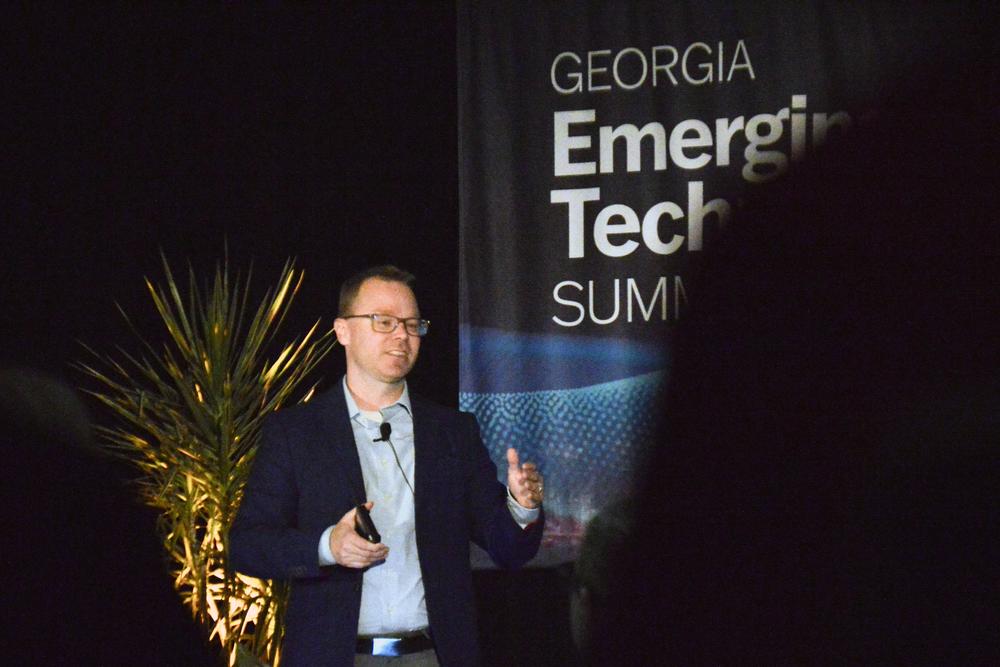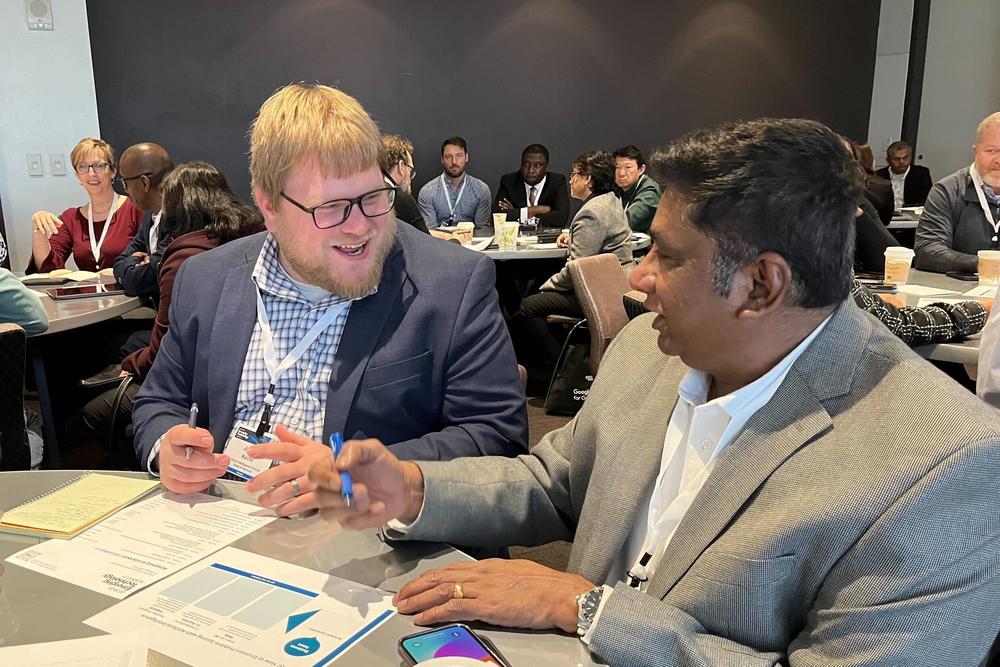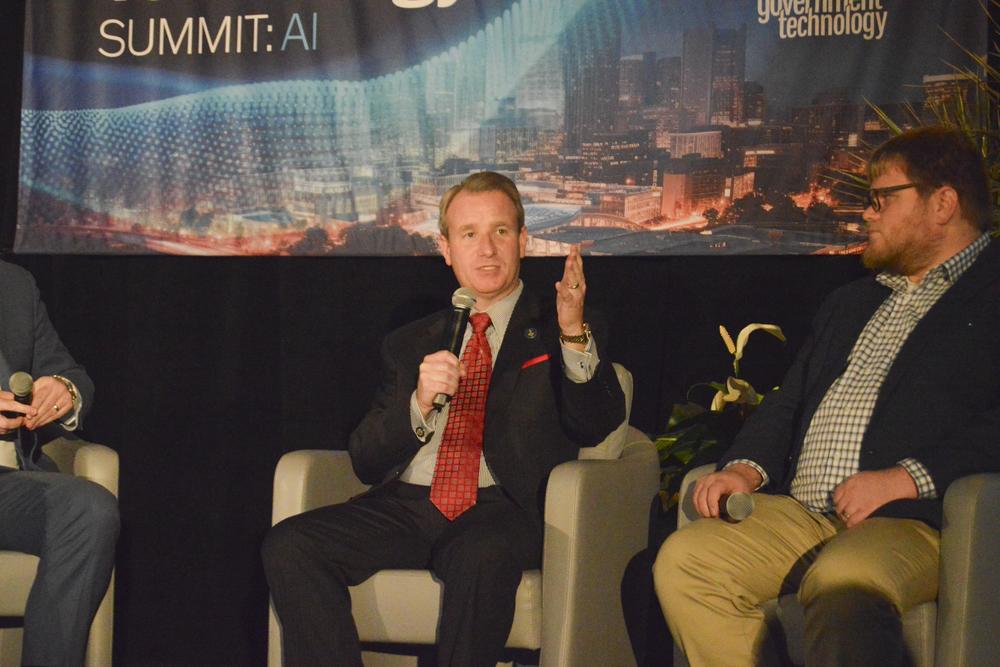
December 21, 2023
A Glimpse Into the State’s Future of Artificial Intelligence
With more than 250 attendees across more than 70 state and local organizations, 6 states, 8 cities, and 5 universities, the 2023 Georgia Emerging Technology: AI Summit focused on artificial intelligence (AI) and its evolving impact on our daily lives, particularly in government sectors. Leaders in the public and private sector explored the current state and future trajectory of this emerging technology.
I heard from several state agency team members who wanted to attend but were a bit late to register before the event reached capacity, or who had conflicts and couldn’t attend. This recap should sum up the day for those interested. We will follow up in 2024 with a series of blog posts that cover the guiding principles governing Georgia’s work in this emerging field.
What Was the Summit About?
The summit was a major gathering of industry AI experts, academic leaders, and government officials to discuss the integration of AI in public services and workforce augmentation. The goal is to enhance government efficiency and decision-making through technology. A significant part of the summit was dedicated to ensuring the responsible use of AI. Topics like innovation, privacy, security, and the prevention of bias in AI systems were key points of discussion. The sessions offered a blend of brainstorming exercises, discussion of regulations, hands-on technology demos, and real-life case studies that provided insights into how emerging technologies can enhance the lives of residents.
The summit was not just about adopting AI; it was about adopting it responsibly.
Key Themes
AI landscape in Public Services
In his keynote presentation titled
The
State of AI in GovTech: Exploring the Future and Charting the Course
, Joe Morris, Deputy Chief Innovation Officer/Head of Market Intelligence at e.Republic, provided a comprehensive overview of the role of AI in the govtech landscape.

To set the stage for the day, the talk covered the current state of AI applications within state and local governments, emphasizing the transformative impact of AI on public services and administration. Various real-world examples enlightened attendees on how AI has been integrated into government processes to enhance efficiency and effectiveness.
The keynote also addressed the future directions of AI in govtech, shedding light on emerging trends and discussing the implications of AI on service delivery. Policy and technology leaders must anticipate AI's growing influence on the public sector and adapt accordingly, he said.
The presentation included strategic recommendations for the govtech industry regarding AI regulation and initial deployment. Governments are in a great position to collaborate, aligning on ethics, equitable access, and the direction of future public sector innovation.
AI Use Cases
In the interactive workshop "AI Lab Part I: Ideation – Crafting Solutions," participants immersed themselves in the world of AI and explored current use cases. Led by Jamia McDonald, Senior Manager at Deloitte, the workshop focused on collaborative, hands-on activities.
During this session, attendees worked together in teams to identify pressing challenges within the public sector that could be effectively addressed using AI solutions. Participants engaged in brainstorming sessions, discussing potential applications of AI to solve these challenges, and began outlining the initial steps for designing and implementing AI-based solutions. The workshop was structured to be inclusive of individuals with varying levels of AI experience, offering a foundational understanding of how AI can serve as a problem-solving tool in the public sector.

This hands-on workshop was a safe space to imagine and fostered a creative environment where innovative AI solutions could be explored. It equipped attendees with practical insights and strategies for integrating AI into public sector problem-solving initiatives.
Additionally, attendees were encouraged to join the follow-up workshop, "AI Lab Part II: Evaluation – Assessing Risks & Rewards," in the afternoon. Participants built upon the insights and ideas generated in the morning session. This workshop shifted the focus toward a critical evaluation of the AI solutions ideated earlier in the day.
Attendees were guided through a comprehensive SWOT analysis, which involved assessing the strengths, weaknesses, opportunities, and threats associated with their proposed AI applications. The emphasis of this workshop was on recognizing potential pitfalls and understanding the broader implications of AI deployment in the public sector.
This session provided a structured framework for participants to thoroughly evaluate the viability and potential risks and rewards of the AI solutions they had brainstormed earlier in the day. By conducting a SWOT analysis, attendees gained a deeper understanding of the practical implications and considerations involved in implementing AI-driven solutions in the public sector.
The second session served as a valuable follow-up to the morning workshop, offering attendees the tools and insights needed to make informed decisions about the adoption and deployment of AI technologies in addressing pressing challenges.
Ethical Use of AI
In the session titled "Building the Ethical Playbook for Emerging Technologies," the focus was on addressing the ethical considerations. The session recognized the increasing importance of understanding and navigating the ethical intricacies surrounding AI, particularly in government deployments.
Moderated by Dr. Rose Procter, Director of the TRUIST Center for Ethical Leadership at the Mike Cottrell College of Business, University of North Georgia, the panel featured insights from experts in the field. The session unpacked ethical considerations uniquely relevant to the use of AI in government settings. This included discussions on public trust and equitable access. The sessions provided a framework for creating an "Ethical Playbook" for AI strategy in the public sector that aligns with the values and principles of public service.
Legislative Side of AI

In the general session titled "The Legislative Side of AI," attendees learned about the intersection of technology and legislation. This panel discussion featured State Senator John Albers, Senate Public Safety Committee Chairman and Joint Committee on Artificial Intelligence Co-Chair, who provided a unique perspective on the challenges of balancing innovation with the well-being of the public.
Josiah Raiche, Director of Artificial Intelligence for the State of Vermont shared lessons learned from his state, which has been at the forefront of legislation guiding AI implementation. Attendees heard the considerations lawmakers must weigh as they contemplate the role of AI for their constituents.. The conversation shed light on how public values and perspectives can be harmoniously integrated into the evolving narrative of AI in governance.
Throughout the discussion, Senator Albers shared insights into the intricate balance that legislators must strike between fostering innovation and safeguarding the public interest. The session emphasized the importance of thoughtful and responsible AI regulation, ensuring that AI technologies are deployed in ways that align with the values and priorities of the communities they serve.
AI's Impact on the Workforce
The summit also looked at how job roles and necessary skills for future employment are being reshaped by an AI-driven world. This session highlighted the multifaceted impact that AI is having on the workforce and how it is affecting various aspects of the job market. Shawnzia Thomas, Chief Information Officer for the State of Georgia, led the discussion, offering her perspective on this evolving landscape. This standing-room-only session encouraged participants to consider how they can adapt and thrive in a world where AI plays an increasingly central role, highlighting the importance of continuous learning and skill development in the face of AI-driven changes in the workforce.
Looking Ahead
In the concluding session, GTA leaders talked about the State’s AI Program. This program will set up an Innovation Lab, enabling GTA to partner with state agencies and vendor partners in defining the overarching goals and specific objectives of employing any emerging technology such as AI. This includes alignment with organizational or state missions, desired outcomes, and measurable targets. As part of this program, GTA has published an AI policy, an AI standard, and a set of guidelines for state agencies. These include clear roles and responsibilities, decision-making processes, and accountability mechanisms. The AI program will develop a set of ethical guidelines and ensure compliance with existing laws and regulations with the goal of addressing issues like fairness, transparency, privacy, security, and bias in AI systems.
This summit was crucial for understanding how AI could be utilized effectively in governance. It provided a platform for tech leaders and businesses to align with governmental goals for societal benefit. For the general public, it promised more efficient and equitable government services. The summit was not just about adopting AI; it was about adopting it responsibly. It highlighted the need for a forward-thinking approach to ensure that technological advancements go hand in hand with ethical considerations.
